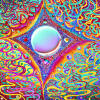
The Principle of ‘Equilibrium’ in Metaphysics
The three universal forces,
Rajas
symbolized by Brahma the Creator,
Sattva
by Vishnu the Sustainer, and
Tamas
by Shiva the Destroyer, are Prakriti’s three modes or the
gunas
in the Sanskrit texts. It is the opposition between Sattva and Tamas
resulting in Rajas, the equilibrium between the centripetal and centrifugal
that is said to be the source of the created universe. Rene Guenon’s
insights into true metaphysical equilibrium and the law of polarity are
explored in his 1946 book ‘The Metaphysical Principles of the Infinitesimal
Calculus.’
Guenon was also a mathematician and his keen interest in mathematics, like
many other metaphysicians, permits us to understand precisely how the loss
of metaphysical wisdom has deformed the once sacred science of numbers. This
loss of knowledge of the sacred symbolism has contributed to the degradation
of our consciousness and the layers of ever increasing density in this Kali
Yuga.
“…although quantity is the only level recognized by modern science, the
numbers that express is also possess qualities, their quantitative aspect
being merely their outer husk [quote
from the backcover].”
Guenon says that the mathematicians of modern times appear to be ignorant of
what number truly is. “Indeed, their entire science is reduced to
calculation in the narrowest sense of the word, that is, to a mere
collection of more or less artificial procedures, which are in short only
valuable to the practical applications to which they give rise.”
This is even more obvious in our own recent times when any kind of
scientific research is only valued for its efficiency to generate profit,
for example the algorithms now being used to play and take advantage of
financial markets – or the billions that have gone into creating weapons for
the military industrial complex.

True ‘number’ is spatial geometry
Guenon says that mathematicians have replaced the true metaphysical essence
meaning of number with the numeral, which is “no more than the clothing of a
number.” According to Guenon the true body of number is its geometric form.
A number symbolizes a geometric form “as the theories of the ancients on
polygons and polyhedrons show when seen in the light of the symbolism of
numbers…in accordance with the fact that all embodiment necessarily implies
a spatialization.”
Mathematicians no longer understand the meaning of the symbols they employ,
which “are like vestiges of forgotten traditions.” Guenon says that not only
do they no longer understand, but also they don’t want the numbers they use
to have any meaning beyond what is quantitatively useful. Science has
distanced itself “further and further from the reality they intend to
explain” and thus obsessed with quantity, has lost all plausible
significance.
In the chapter ‘Representation of the Equilibrium of Forces’ Guenon states
that the principles upon which modern mathematicians build their science
have nothing in common with true universal principles, but relate more to
what may be termed laws of mechanics as specialized applications.
As an example Guenon chooses the
‘so-called law of inertia’ which he says nothing can justify nor experience
because inertia has no role in nature. What does exist is the law of
equilibrium and equilibrium immediately tends to re-establish itself once it
has been disturbed. Reaction to disturbance is equivalent to that which has
provoked it. According to Guenon this is termed ‘concordant actions and
reactions’ in Far-Eastern traditions and this principle “does not concern
the corporeal world alone, as do the laws of mechanics, but indeed the
totality of manifestations in all its modes and states.”
Again we are led into a more subtle understanding of our current state of
delusion. Disconnecting from the eternal metaphysical principles that are
our Source and create the manifest universe has left us vulnerable to
endless displays of false enticements and ever-increasing forms of tyranny
and bondage. One wonders if the new webs technology is weaving around our
planet will leave room for any freedom of thought as the young become more
entranced by hypnotic passing titillation on their screens. When there is no
more freedom for the God-within us to expand and play here in this realm
what can remain but the end, the closing of another cycle of time.

Equilibrium between compression & expansion
Guenon states that the true metaphysical meaning of equilibrium encompasses
the attractive and repulsive forces of the natural, mechanical and subtle
orders. The attractive forces are “considered as compressive forces, or
forces of contraction” [centripetal]; and repulsive forces are considered as
“expansive forces [centrifugal], or forces of dilation, and basically this
is no more than an expression in a particular domain of the fundamental
cosmic duality itself.”
The Law of Polarity
These two forces compression and expansion exist in perfect relationship and
correspondence to each other; and must be seen “correlatively, each of which
could not exist without the other; this is what one can call the law of
polarity.” The law of polarity “presides over all manifestation” and applies
to all natural phenomena.
Guenon says something that I personally have found illuminating because I
have been studying the theories of the Electric Universe, which I found to
be more in line with eternal metaphysics that previous theories. However,
instinctually intuitively I have just simply felt something is missing,
incomplete, some lack of a deeper understanding of the foundation beneath
all appearances — beneath the level of ‘matter’ even in its plasma state. So
when I read Guenon saying that this law of polarity is “above all evident in
electrical and magnetic phenomena, but it is by no means limited to them” it
all clicked for me.
“By no means limited to…”
As wonderful and more profoundly true as the Electric Universe theories and
plasma physics are, they are stuck — limited in the concept of matter
itself. Indeed the metaphysical law of polarity is evident in electrical and
magnetic phenomena, but as Rene Guenon states it is by no means limited to
them. Another layer exists ‘beneath the curtain of each atom’ — it is the
substratum beneath, beyond and within the appearance of solidity and all
temporal matter.
The layer ‘beneath’ is termed Prakriti in Sanskrit and is the pure
potentiality of universal substance, Aristotle’s
materia prima.
Guenon says this substratum is “assuredly something completely different
from the ‘matter’ of the physicists” and even quite different from plasma as
the first matter. The Sanskrit Prakriti or materia prima, for which there is
no word equivalent in English, “as a universal principle, is pure potency in
which nothing is distinguished or actualized, and it constitutes the passive
‘support’ of all manifestation.”

Prakriti is Uncaused
The Samkhya Karika defines Prakriti: “The Primal Nature is non-evolute. That
which procreates or evolves, i.e. brings into existence other Tattvas
[categories] is Prakriti; also called Pradhâna, the Primordial, representing
the state of equipoise of the attributes of Sattva, Rajas, and Tamas — and
is non-evolute, that is to say, Prakriti is only an Evolvent. …it is the
root [Mûla] of all other evolutes, while also being at the same time the
Primal Matter. It is the roots of the aggregate of all products (i.e. the
universe), while it has no root of its own as it is uncaused.”
In ‘The Reign of Quantity’ Rene Guenon continues his illumination of
Prakriti as the
materia prima:
“…universal substance alone is pure potency, and it is situated not only
beneath our world…but also beneath the whole of all the worlds and all the
states comprised in universal manifestation….it is potentiality, absolutely
‘undistinguished’ and undifferentiated universal substance…” Prakriti is a
conception of a more universal order than matter. There is no word in
Sanskrit that translates into matter and the word Prakriti is so profound,
subtle and complex that it must be deeply studied and contemplated. Prakriti
is the mother of forms, the root that is without root. Identified with Mâyâ
the creative principle and Shakti power, Prakriti “is undifferentiated
(avyakta) and undistinguishable, neither compounded of parts…inferable from
its effects only, since it is imperceptible in itself…[Guenon: Man and His
Becoming According to Vedanta]”
The three
gunas,
Rajas-Sattva-Tamas, are the constitutive qualities which “are in perfect
equilibrium in the state of primordial indifferentiation; every
manifestation or modification of substance represents a rupture of this
equilibrium, and beings in different states of manifestation participate in
the three
gunas
in different degrees…[ibid]” It is Prakriti’s creative power, the Mâyâ
Shakti, that weaves the holographic universe into temporal appearances.
Modern physicists regard matter as being endowed with properties that were
discovered by relying solely on five-sense perception. Therefore they are
stuck in “the sensible world and do not go beyond it” as Guenon says. Their
approach is from “below upward” from the point of substance — and this
“immediately gives the reason why modern science lacks all explanatory
value.” Rather the true explanation of things must be sought in their
essence and “must proceed from above downward.”
Guenon’s attitude may shock and amuse us at first, however the inimitable
genius Arthur Koestler said it best in his brilliant assessment of science,
‘The Sleepwalkers, A History of Man’s Changing Vision of the Universe’:
“If there is a lesson in our story it is that the manipulation, according to
strictly self-consistent rules, of a set of symbols representing one single
aspect of the phenomena may produce correct, verifiable predictions, and yet
completely ignore all other aspects whose ensemble constitutes reality.
[Koestler quotes author JWN Sullivan] “…Science deals with but a partial
aspect of reality, and…there is no faintest reason for supposing that
everything science ignores is less real than what it accepts… Why is it that
science forms a closed system?
Why is it that the elements of reality it ignores never come in to disturb
it? The reason is that all the terms of physics are defined in terms of one
another. The abstractions with which physics begins are all it ever has to
do with…”

The residue of vanished things
Koestler: “Modern physics is not really concerned with ‘things’ but with the
mathematical relations between certain abstractions which are the residue of
the vanished things. In the Aristotelian universe, quantity was merely one
attribute of things, and one of the least important.”
Even as I write this, I know somewhere the obsessed and ambitious are
writing another algorithm that will enable the elite overseers of the planet
to keep track on my every thought, feeling and movement. This quantitative
science that has completely disconnected from metaphysical truth, from Rita,
Satya and Dharma is leading us into the Abyss, poisoning our beloved only
home planet, and creating weaponry that threatens the rest of the galaxy
with the glaring potential to disrupt the fabric of space-time itself.
Koestler says, “Each advance in physical theory, with its rich technological
harvest, was bought by loss in intelligibility. These losses on the
intellectual balance sheet…were light heartedly accepted as passing clouds
which the next advance would dissolve.” Koestler speaks of the hubris of
modern science, but none could have predicted that the rapid advance of the
marvels of computational technology could bring the entire planet under the
net of Aldous Huxley’s prescient Brave New World, the loss of all personal
privacy, freedom, and perhaps one day the most efficiently suffocating
totalitarian dictatorship the world has ever known.

Genius as receivers & not originators
Guenon says that the metaphysical principles that create and govern the
universe are eternal and thus “realities of the mathematical order, like all
other realities, can only be discovered and not invented.” [The Metaphysical
Principles of Infinitesimal Calculus] This is exactly what the Seers and
scholars have said about the Vedas — they do always exist, they are eternal.
They are revealed or concealed in the various cycles of time, but they are
always in existence. Thus all Knowledge is forever existing ‘there’ in the
unmanifest, in the equilibrium, waiting for the intensely focused,
dedicated, inspired and patient ones to bring that eternal Wisdom-Knowledge
into this realm. Veda means knowledge, revealed wisdom as knowledge.
Thus Guenon in his usual charming French way decries the egotistical claims
of those who imagine they have created anything original and makes clear
that “the role of those who are called ‘great men’ is to a great extent
often a role of ‘reception’ — though they are generally the first to delude
themselves as to their originality.” Lately I find Guenon’s often
razor-edged predispositions refreshing, comforting and a necessity in this
otherwise dark era.

Prakriti is the Matrix of Creation
The etymology of the Sanskrit word Prakriti is from the root
√kri
[the
ri
being a vowel], which signifies action and means to make, cause, create,
produce or perform. The prefix
pra
signifies that it ‘precedes’ in the sense that it has forward movement,
indicating a creative force, a forward movement.
Prakriti as the ultimate principle is defined in Samkhya and Yoga:
“…Prakriti is the material principle and the opposite of the principle of
self or ‘content-less consciousness’ (Purusha). Prakriti is independent, all
pervasive, precedes the existence of time and space, and is the ultimate
material principle, immensely powerful, containing the whole world in a
subtle undifferentiated state.” [Jacobsen]
Prakriti as the material principle exists in both her manifest and
unmanifest states. She lies dormant yet still containing the universe in its
subtle undifferentiated state during any Pralaya, the periodic cosmic
dissolution or period of repose and re-absorption.
“The embodied person and the cosmos are constituted of the same matter and
similarly structured. …Prakriti is the subtle material power within
phenomena which produces their manifest forms…the inner principle which
causes things into being. Prakriti expresses the unity and interdependence
of the worlds of gross and subtle matter. It denotes the innate nature of
living beings, the world’s innate nature, and the material world in its
totality. It therefore expresses the correlation of the micro- and the
macro- cosmos. It is the creative material stuff of the world, the
generative principle, that from which the world is produced, and that into
which it will dissolve, in the eternal rhythm of death and rebirth,
withdrawal and manifestation.” [Jacobsen]

The power resides in equilibrium
In his encyclopaedic work ‘The Gods of India’ Alain Danielou speaks of
equilibrium in the chapter on Brahmâ. He says that the possibility of form
is dependent of the existence of ‘place’ in the sense of space-time and this
is the result of equilibrium. In other words equilibrium contains the
potential for all manifestation. The source of the manifest world is the
equilibrium between two opposites, between centripetal and centrifugal, and
is therefore “neither Vishnu (Sattva sustains) nor Shiva (Tamas destroys),
neither concentration nor dispersion, but the result of their equilibrium,
the third tendency Rajas (creates).” In later texts the creative powers of
Brahma became identified with Shakti.
Equilibrium is the source of all power, creation and manifestation. Guenon:
“Far from being the state of non-existence, equilibrium is on the contrary
existence considered in and of itself, independent of its secondary,
multiple manifestation; moreover, it is certainly not Non-Being, in the
metaphysical sense of the word, for existence, even in this primordial and
undifferentiated state, is still the point of departure for the multiplicity
of numbers.”
Thus it is in the equilibrium that all true power is to be found and this is
what our profit-motivated five-sense based science does not, could not
comprehend. This
avyakta
(unmanifest) power that is the substratum within all, can only be accessed
through higher consciousness. The Pythagoreans understood the hubris of
science, and “recognized it as a potential means both of man’s liberation
and destruction; hence their insistence that only those purified in body and
spirit should be trusted with its secrets. …Science may become a hymn to the
creator or a Pandora’s box, and should be trusted only to saints.” [Arthur
Koestler]

Bhagavad Gita IV.10
Those whose greed, fear, and anger have disappeared, who are absorbed in
God-Consciousness, are purified by the austerity of Wisdom-Knowledge, and
reach the state of being of the One.
V. Susan Ferguson

The Metaphysical Principles of the Infinitesimal Calculus, by Rene Guenon,
1946; Sophia Perennis, Hillsdale NY, 2001, 2004.
The Sleepwalkers, A History of Man’s Changing Vision of the Universe, by
Arthur Koestler; Arkana, Penguin Books, Hutchinson of London, 1959.
The Limitations of Science, by J.W.N. Sullivan; New York, 1949.
Prakriti in Samkhya-Yoga, Material Principle, Religious Experience, Ethical
Implications, by Knut A. Jacobsen; Motilal Banarsidass Publishers Private,
Delhi, 2002.
The Reign of Quantity and the Signs of the Times, by Rene Guenon, 1945;
Sophia Perennis, Hillsdale NY, 2001, 2004.
Man and His Becoming According to Vedanta, by Rene Guenon, 1925; Sophia
Perennis, Hillsdale NY, 2001.
The Gods of India, Hindu Polytheism, by Alain Danielou, 1964; Inner
Traditions, NY, 1985.
|
Questions
or comments about articles on this site: |
Copyright© V. Susan Ferguson |
Technical questions or
comments about the site: |
|
|